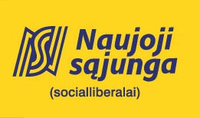Naujoji sąjunga (socialliberalai)
| Naujoji Sąjunga (Socialliberalai) New Union (Socialliberal) |
|
|---|---|

|
|

|
|
| Party leader | Artūras Paulauskas |
| founding | 1998 |
| resolution | July 9, 2011 |
| Headquarters | Vilnius |
| Alignment | Left liberalism |
| Colours) | Blue, yellow, white |
The Naujoji Sąjunga (Socialliberalai) ( NS , German: Neue Union (Sozialliberale) ) was a political party in Lithuania .
The party was founded in 1998 and has since been led by Artūras Paulauskas , on whose personality it was very dependent. The party was financially supported by Viktor Uspaskich .
Their politics were based on the social liberal fundamental values: freedom of the individual, social solidarity, welfare and justice. Naujoji Sąjunga was a member of the European Liberal Democratic and Reform Party (ELDR) and an observer at the Liberal International .
In the elections to the Lithuanian parliament on October 10, 2004 , the party entered into an electoral alliance with the social democrats from the Lietuvos socialdemokratų partija , A. Brazausko ir A. Paulausko koalicija "Už darbą Lietuvai" (A. Brazauskas 'and A. Paulauskas' coalition "Work for Lithuania") , which received 20.7% of the vote. The Naujoji Sąjunga moved into the 141-seat Seimas with 11 MPs .
In March 2006, the affair surrounding party chairman Paulauskas, as a result of which many members of the government parliamentary groups voted to resign as chairman of parliament, led to a rift and the social liberals to leave the governing coalition. At the beginning of 2008, however, the party returned to government in order to show itself in the light of current politics before the upcoming parliamentary elections. Paulauskas became Minister of the Environment in January 2008, and Algirdas Monkevičius became Minister of Education and Science in May 2008.
This calculation did not work: in the parliamentary elections in October 2008, the party entered as its own list, but with 3.6% of the valid votes missed the 5% hurdle and thus clearly entered parliament. The only member of the NS is now Valerijus Simulikas, who was able to win his constituency directly.
After the elections, Artūras Paulauskas took over political responsibility for the severe election defeat and resigned from the party leadership. His successor was Algirdas Monkevičius interim. At the party congress on February 28, 2009 Paulauskas stood for election and was re-elected party chairman with 680 votes (compared to 41 for opposing candidate Gintautas Kniukšta).
The party had over 5,600 members at the end of 2008.
On July 9, 2011, the party disbanded and largely merged with the Darbo Partija (Labor Party). A minority joined the Alliance Liberalų ir centro sąjunga (Liberal and Center Union).
Individual evidence
- ↑ Magdalena Solska: The systemic crisis of communism and the development of the party systems in Estonia, Latvia and Lithuania 1988-2011: National identity, cleavage politics and party competition in Northeast Europe , Münster 2013, p. 128, footnote 30.
- ↑ Naujosios sąjungos vadovu išrinktas A.Paulauskas (German: Re-election of A. Paulauskas as party chairman ), delfi.lt February 28, 2009 (Lithuanian).
- ↑ Daugiausia narių pernai turėjo LSDP, daugiausia pajamų gavo DP (German: Party Statistics of the State Electoral Authority ), delfi.lt March 2, 2009 (Lithuanian).